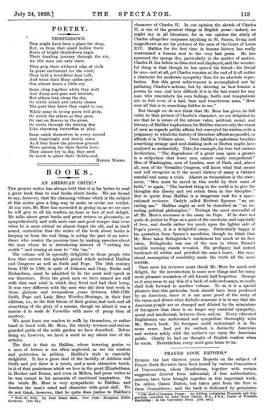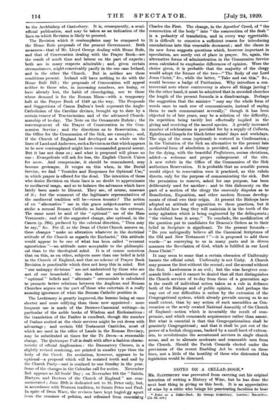PRAYER BOOK REFORM.* Duitnto the last thirteen years Reports on
the subject of Prayer Book Revision have been issued by various Committees of Convocation, whose Resolutions, together with certain suggestions derived from influential, if less authoritative, sources, have been, brought together in this important work. Its editor, Canon Dalton, has taken part from the first in these Committees; and the book is dedicated by permission
• The Book of Common Prayer. An Edition containing Proposals and Sug- gestions. compiled by John Neale Dalton, ILA., F.S.A., Canon of Windsor. Cambridge : at the University Press. [30s. net.]
to the Archbishop of Canterbury. It is, consequently, a semi- official publication, and may be taken as an indication of the lines on which Revision is likely to proceed.
The Revision which it contemplates may be compared to the Home Rule proposals of the present Government. Both measures----that of Mr. Lloyd George dealing with Home Rule, and that of Convocation dealing with the Prayer Book—are the result of much time and labour on the part of experts ; both are in many respects admirable ; and, given certain circumstances, might conceivably pacify in the one case Ireland, and in the other the Church. But in neither are these conditions present. Ireland will have nothing to do with the Home Rule Bill ; the proposals of Convocation will appeal neither to those who, in increasing numbers, are losing, or have already lost, the habit of churchgoing, nor to those whose demand is for the Roman Missa—with a temporary halt at the Prayer Book of 1549 en the way. The Proposals and Suggestions of Canon Dalton's book represent the Anglo- Catholicism of the Caroline divines, brought up to date by a certain veneer of Tractarianism and of the advanced Church- manship of to-day. The Note on the Ornaments Rubric ; the rearrangement of the Prayer of Consecration in. the Com- munion Service ; and the directions as to Reservation, in the Office for the Communion of the Sick, are examples ; and, if the Church of England had developed as a whole on the lines of Laud and Andrewes, such a Revision as that which appears to be now contemplated might have commanded general assent. But it has not done so ; and what is proposed will please no one : Evangelicals will ask for leas, the English Church Union for more. And compromise, it should be remembered, may become grotesque. It verges on this when, in the Burial Service, we find " Veraicles and Responses for Optional Use," in which prayer is offered for the dead. The intention of those who desire Revision on these lines is no doubt to approximate to mediaeval usage, and, so to balance the advances which have lately been made to Dissent. They are, of course, unaware of it ; .but the comment of the legitimate representatives of the mediaeval tradition will be—risum teneatia ? The notion of an " alternative " use in this grave subject-matter would strike a normal Roman Catholic as ludicrous in the extreme. The same must be said of the " optional " use of the Mass Vestments ; and of the suggested change, also optional, in the Canon (p. 284), prefaced by the rubrical direction, "Then may he say," &c. For if, as the Dean of Christ Church seances us, these changes "make no alteration whatever in the doctrinal attitude of the Church as regards the Eucharist," this attitude would appear to be one of what has been called "reverent agnosticism "—an attitude more acceptable to the philosophi- cal than to the theological mind. It is of course notorious that on this, as on other, subjects more than one belief is held in the Church of England, and that no scheme of Prayer Book Revision is practicable which does not keep this in, mind. But "our unhappy divisions" are not understood by -those who are not of our household ; the idea that an authorization of " optional " beliefs and " alternate " ceremonials is calculated to promote better relations between the Anglican and Roman Churches argues on the part orthose who entertain it a really amazing ignorance of what the Boman Catholic position is.
The Lectionary is greatly improved, the lessons being at once shorter and more edifying than those now appointed : more frequent use is made of the Deutero-Caanonical writings—in particular of the noble books of Wisdom and Ecclesiasticus the translation of the Psalter is excellent, though -the number of Psalms recited at the choir services might be out down with advantage ; and certain Old Testament Canticles, most of which are used in the office of Lauds in the Roman 'Breviary, may be substituted at times for the Te Deum—a reasonable change. The Quicunque Vult is dealt with after a fashion charac- teristic of official Anglicanism : the Damnatory Clauses, in a slightly revised rendering, are printed in smaller type than the body of the Creed. Its recitation, however, appears to be optional—a proposal which will be resisted tooth and nail by the Church Party—and is confined to one Sunday in the year. Some of the changes in the Calendar call for notice. November 2nd appears as All Souls' Day ; on November 8th the "Saints, Martyrs, and Doctors of the Church of England" are com- memorated; June 29th is dedicated not to St. Peter only, but, in accordance with Western tradition, to Saints Peter and Paul. In spite of Dean Ware, the revisers have kept hagiolcgy apart from the romance of politics, and refrained from can.onising Charles the First. The change, in the Apostles' Creed, of "the resurrection of the body" into "the resurrection of the flesh" is a pedantry of translation, and in every way regrettable. It is difficult to conceive a sufficient reason for introducing emendatioru3 into this venerable document ; and the clause in its new form suggests questions which, however important in speculation, are surely out of place in prayer. So, again, the alternative forms of administration in the Communion Service seem calculated to emphasize differences of opinion. Were the choice given, it is probable that the majority of the clergy would adopt the former of the two—" The Body of our Lord Jesus Christ," &c., while the latter, "Take and eat this," &c., would become a badge of Puritanism. Why introduce a con- troversial note where controversy is above all things jarring ? On the other hand, it must be admitted that in crowded churches the length of the present formula is a disadvantage. Perhaps the suggestion that the minister "may say the whole form of words once to each row of communicants, instead of saying them to each communicant severally," though it has been objected to of late years, may be a solution of the difficulty, its repetition being tacitly but effectually implied in the giving and receiving of the sacred species. A greatly increased number of celebrations is provided for by a supply of Collects, Epistles and Gospels for black-letter saints' days and weekdays. The sign of the cross (optional) is restored in Confirmation ; in the Visitation of the Sick an alternative to the present late mediaeval form Of absolution is provided, and a short Litany for the dying, with the beautiful Proficiscere, anima ehristiantz, added—a welcome and proper enlargement of the rite. A new rubric in. the Office of the Communion of the Sick authorizes Reservation. It is probable that no sensible person would object to reservation were it practised, as this rubric directs, only for the purpose of communicating the sick. But the permission to reserve, asked for one purpose, has been deliberately used for another : and to this dishonesty on the part of a section of the clergy the unseemly disputes as to Benediction, Exposition, and other modern Roman develop- ments of ritual owe their origin. At present the Bishops have adopted an attitude of opposition to these practices, but it is doubtful how long they will maintain it in the teeth of the noisy agitation which is being engineered by the delinquents ; "the violent bear it away." To conclude, the modification of the question put to candidates for Deacon's Orders as to their belief in Scripture is significant. To the present formula,— " Do you unfeignedly believe all the Canonical Scriptures of the Old and New Testament 1 "—it is proposed to add these words—" as conveying to LIB in many. parts and in divers manners the Revelation of God, which is fulfilled in our Lord Jesus Christ."
It may seem to some that a certain obsession of Uniformity haunts the official mind. Uniformity is not Unity. A Church may possess the first without the second; and the second without the first. Lawlessness is an evil ; but the wise lawgiver com- mands little : and it cannot be denied that all that distinguishes the Church services of to-day from those of a generation .ago is the result of individual action taken as a rule in defiance both of the Bishops and of public opinion. And perhaps the way out of our difficulties is rather by the extension of the Congregational system, which already prevails among us to no small extent, than by any action of such assemblies .as Con- vocation or the newly created National Assembly of the Church of England—action which is invariably the result of com- promise, and which. commands acquiescence rather than assent. But what is essential is that this Congregationalism shall be genuinely Congregational ; and that it shall be put out of the power of a foolish clergyman, backed by a small knot of extrem- ists, to revolutionize the accustomed services in single church areas, and so to alienate moderate and reasonable men from the Church. Should the Parish Councils elected under the provisions of the recent Enabling Act be worked on these lines, not a little of the hostility of those who distrusted this legislation would be disarmed.



































 Previous page
Previous page